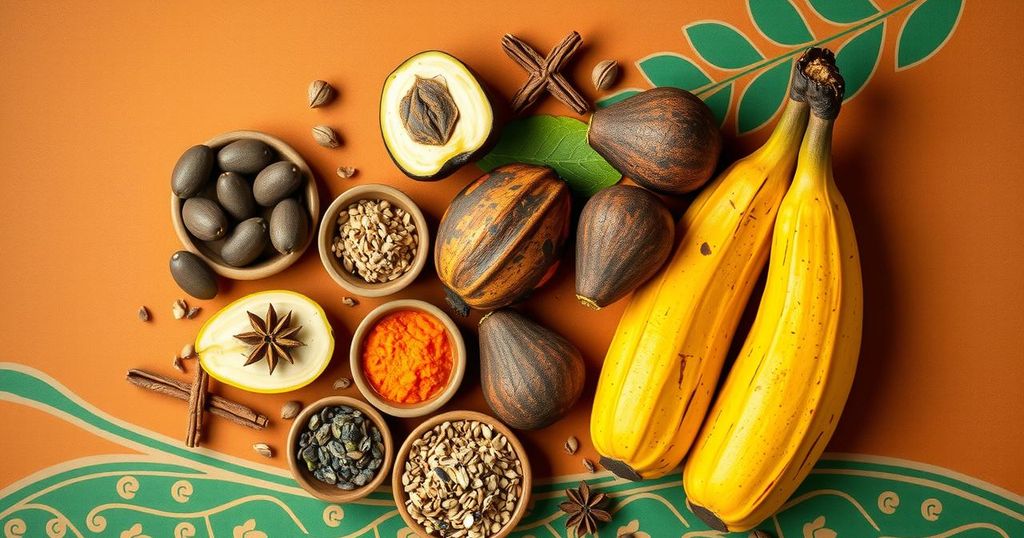Eric Adjepong: Connecting Cultural Identity to Culinary Arts

Eric Adjepong, known from “Top Chef,” is a first-generation Ghanaian American chef launching his restaurant Elmina and cookbook, “Ghana to the World.” He discusses how his heritage shapes his culinary identity and emphasizes traditional ingredients like egusi seeds. Adjepong shares cherished recipes like stewed turkey wings and sweet fried plantains, blending heritage with innovation in his cooking.
Eric Adjepong, known from two seasons of “Top Chef,” is a first-generation Ghanaian American who integrates his cultural identity into his culinary career. With the upcoming opening of his new restaurant, Elmina, in Washington, D.C., and the release of his cookbook, “Ghana to the World: Recipes and Stories That Look Forward While Honoring the Past,” Eric emphasizes the significance of Ghanaian flavors and traditions in his cooking.
In an interview for his cookbook release, Adjepong shared that his Ghanaian heritage profoundly shapes his worldview and culinary philosophy. He believes that the unique perspectives of individuals from Ghana enrich the culinary arts, as they express warmth and hospitality through food. His family and community have played a pivotal role in honing his culinary skills and deepening his cultural connections.
Recalling his early years, Adjepong fondly remembers his formative experiences in Ghana between ages two and six. He described distinct memories, such as playing with a toy police car at his grandparents’ house and enjoying fried donuts from street vendors, which remain significant touchpoints of his Ghanaian heritage.
In discussing traditional seasonings essential to Ghanaian cuisine, Adjepong highlighted curry powder, peri peri pepper, and aromatic spices like cinnamon and nutmeg as foundational ingredients. He also referenced a house seasoning used by his mother, which consisted of paprika, garlic powder, and fennel, among other spices, that added depth to her dishes.
Adjepong elaborated on the nutritional benefits of egusi seeds, which are often included in soups and stews. He compared egusi to pumpkin seeds and noted its earthy flavor and high fiber content, making it an excellent ingredient to nourish families economically and healthfully. His cookbook features multiple dimensions of egusi, showcasing both traditional recipes and his innovative interpretations.
When comparing banku and fufu, two traditional Ghanaian dishes, Adjepong explained that fufu is made from cassava and plantain, yielding a soft texture, while banku, made from fermented cornmeal, carries a unique tang. He expressed a personal preference for banku, emphasizing the cultural ritual of eating with hands, which enhances the connection to the food and the dining experience.
Adjepong underscores his affection for sweet fried plantains, describing a special recipe that incorporates benne seed miso, which he discovered through the “Keepwell” organization. This combination infused the dish with an earthy richness that complemented the natural sweetness of the ripe plantains.
Among his cherished recipes is the stewed turkey wings, created by his aunt Agatha. Adjepong elaborated on the dish’s preparation, which involves a two-step process of boiling and frying before being complemented with a vibrant tomato sauce. He highlighted that it is not an everyday meal, thus making it a special occasion dish that carries fond memories.
As an offering from his cookbook, Adjepong provided a recipe for Egusi and Coconut Granola, characterized by the flavors of egusi seeds and coconut nectar. It serves as a delicious snack or topping, reflecting the sweet and nutty flavors that resonate within Ghanaian cuisine. It exemplifies how traditional ingredients can be adapted for broader culinary applications, enhancing connections between heritage and contemporary dining.
Eric Adjepong’s journey as a first-generation Ghanaian American shapes his culinary identity and influences his recipes, which reflect both cultural heritage and innovative cooking practices. His forthcoming restaurant and cookbook embody a celebration of Ghanaian flavors, emphasizing the importance of traditional ingredients and familial recipes. Through his work, Adjepong seeks to bridge cultural divides and share the unique essence of Ghana with a broader audience.
Original Source: www.kcrw.com







